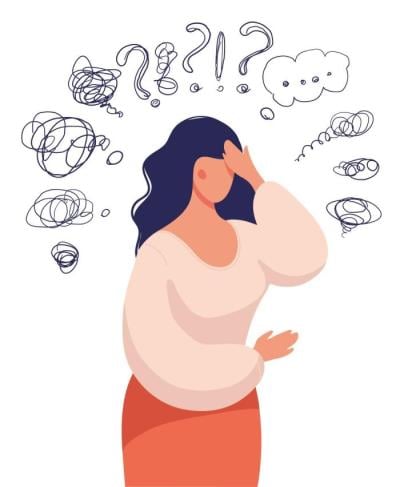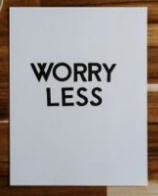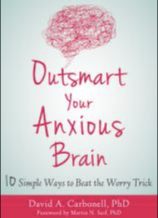The Difference Between Planning and Worrying
The Difference Between Planning and Worrying

I have been studying, writing about, and treating worry since 1989—and I have personally engaged in habits of worry longer than that! Several months ago I shared some suggestions for how to work with busy minds in general, partly because I was noticing how busy my own mind was, in the midst of local, national, and international heartaches. Lately, I’ve been noticing the ways that, despite decades of studying worry, my mind can trick me into a ruminative spiral by telling me I am planning or preparing rather than uselessly worrying.
On the one hand, being able to imagine multiple outcomes is part of what allows us to make skillful decisions. When I was younger, I used to estimate my time to travel someplace or complete a task based on assumptions that everything will go perfectly (no traffic, no lost keys, no last-minute detours…). Over time (and lots of stress associated with being late to meetings, dinner with friends, or professional deadlines), I learned to imagine some things going wrong (a traffic jam that Google maps didn’t see until I was en route, an emergency that interrupted planned writing time, the dreaded writer’s block). This anticipatory mind in turn helped me make more realistic time estimates and reduce my stress and guilt—obviously a good thing!
Other times, my mind (and many of our minds) would go down a road of rehearsing every possible negative outcome, leaving me unable to make decisions or even get started (What if I make the wrong decision? What if this isn’t the best place to start?) (see Metzger and colleagues, 1990; Stober and Joorman, 2001 for research supporting these associations). And, lately, I’ve noticed that this worry cycle can emerge right in the middle of useful planning. One minute I’m thoughtfully looking over the coming month and what I plan to accomplish during this time; the next moment I’ve lost myself in repetitive rehearsal of things that might go wrong, my body is tense, and I’m no closer to any of my goals. So how can we tell the difference?
As I wrote about in another post, to change (old) habits we need to develop new habits. For instance, I encourage folks to develop habits of noticing your reactions, particularly your thoughts, then pausing, and practicing compassion for whatever your mind is naturally doing. It helps me to remember that my mind is trying to protect me from harm, even though it may be overcorrecting and actually interfering with my life in its intense efforts to be of help. When we are able to practice compassionate awareness of our minds, we can begin to notice signs that we may be stuck in a worry loop, even if it seems like we are planning or preparing.
Signs that we are stuck in worry
Indications that we may be stuck in a problematic cycle of worry include:
- Our mind is looping through repetitive material, over and over again, often taking the form of “What if…” questions, followed by imagined negative outcomes
- We experience intense anxiety in our bodies (e.g.,racing heart, tension, stomach tightening) each time we imagine a potential outcome (and thereby increase our anxious arousal with our minds)
- We are not taking actions, but instead feel behaviorally frozen and unable to take any meaningful actions
Questions we can ask ourselves to get unstuck
- Is there anything I can do right now that would help me prepare for this future event or context and make it more likely to go well? (It can be helpful to select a small action that isn’t too time consuming.)
- If the outcome I’m fearing is likely, is there anything I can do to prepare myself for it? (This could be putting support in place in case the event happens, or reminding myself that I have coped with similar outcomes in the past.)
- Am I trying to find a way to control something that is uncontrollable? (Often we get stuck in cycles of worry because we want to find ways to control our emotional responses, other people’s responses, or external events. However, although we can influence these things, we do not have absolute control over them. When we recognize that we are trying to control things we cannot control, we can have compassion for this natural impulse and then gently let go of the rigid effort to control. It can be helpful to remind ourselves that uncertainty is a natural part of life and that we can find possibility in it.)
- Have I moved from lightly considering outcomes to vividly imagining them? I notice that sometimes when I intend to be engaging in a process of reviewing potential outcomes, instead I begin to immerse myself in imagining that the potential problem has already catastrophically happened, and experiencing all the emotions I would if it did happen (which it hasn’t). With practice, it becomes easier to hold potential negative outcomes more lightly, consider how we can avoid or cope with them, and then continue engaging in planning and preparation, rather than being caught in fear and worry.
- What can I do now? One of the most effective ways to counter feeling lost in our worries is taking meaningful action. Engaging in a practice of recognizing what matters to us is a helpful foundation so that when we find ourselves in a cycle of worry, we can reconnect to what matters to us and identify a meaningful action that we can take in the moment to disrupt the worry cycle. Sometimes I find it helpful to take an action of connecting with others, or doing something else I find nourishing, before I return to work—the most important step is to notice the stuckness and then engage in some kind of action.
So when we find our minds starting to spiral about what action to take, we can just pick something, try it out, and then see how that goes. After all, we can always try something else next time!
With thanks to Josh Bartok for editing assistance.
Read more articles by Lizabeth Roemer, PhD at Psychology Today, Mindfully Doing What Matters.
References
- Metzger, R.L., Miller, M.L., Cohen, M., Sofka, M. and Borkovec, T.D. (1990), Worry changes decisionf making: The effect of negative thoughts on cognitive processing. J. Clin. Psychol., 46: 78-88
- Stöber, J. and Joormann, J. (2001) Worry, procrastination, and perfectionism: Differentiating amount of worry, pathological worry, anxiety, and depression. Cognitive Therapy and Research, 25 (1). pp. 49-60.




















